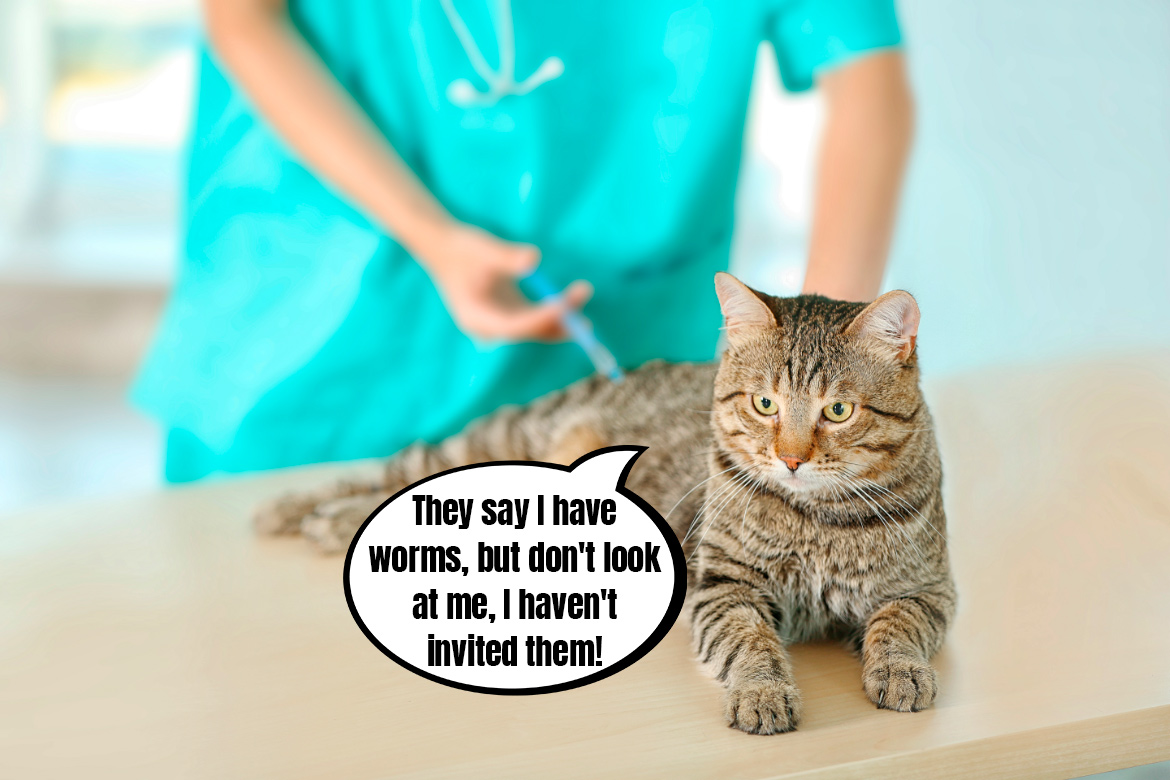A clean litter box, fresh food, spotless house – can cats living in such conditions get worms? Though we would love to believe that it’s impossible, even the laziest of furs can, unfortunately, get sick. Obviously, indoor cats aren’t in as big of a risk for worms as outdoor cats or dogs are, but the risk is never zero. Today, dear fabCats, let’s talk about why it’s advised to test our cats regularly and deworm them even if they are the typical couch potatoes.
Can indoor cats get worms?
One of the often repeated myths within the cat world is that domestic, indoor cats who don’t have much contact with other cats and animals are generally safe from getting worms, fleas and other parasites. The myth didn’t come from nowhere, of course – in theory, if the cat is strictly indoors, they shouldn’t be able to catch parasites if the house is tidy, their litter box is cleaned out regularly and their food is always fresh. However, once health issues show up and the vet orders a fecal test, sometimes they come up positive for worms. It’s only then we, Carers, shake our heads and wonder – how is that possible?
As it turns out, invasive forms of parasites can come into our house unnoticed and it’s often us, cat Carers, who play a role in it. When we walk on grass, paths and sidewalks where other animals could’ve been doing their business previously, we collect a lot of young forms of parasites and their eggs that are invisible to the human eye but can be carried on our shoes into our homes. We don’t need to go into panic mode all of a sudden and disinfect our shoes everytime we come back home, but it’s good to be aware of the risk – our shoes come into contact with many nasty things and we know of cats who like to put their heads inside hooman’s shoes or sniff around them every time their Carers get home. To minimize the risk we recommend limiting the area we touch with our shoes to the entry hallway and always putting extra effort into cleaning the floor where we keep our shoes on a daily basis.
How often should we deworm our cats?
One of the methods of fighting parasites residing in our cats’ digestive systems is deworming – a treatment in which we give the cat medicine that fights both the adult and young forms of parasites. We’ve heard many contradicting opinions on how often you should deworm your cats. Only a few years ago the most common advice was to deworm 1-2 a year (or more often for indoor-outdoor cats), but as the years have gone by, specialists started to put more focus on testing the cats before administering medicine and checking cats’ poop in a lab to see if the parasites are even there to begin with.
Is the “new” method better than the old one? Yes and no. Though it is good to test our cats regularly before administering them any medicine blindly, any lab tests can come back as false positives or false negatives. What it means is that we can have cases where the worms remain unnoticed despite the cat being tested as well as cases where the cat gets medicine when they don’t need them. What many cat Carers do is a mixed approach: they test their cats at least twice a year and give them deworming treatment once a year as a preventative measure. When cats live in bigger colonies or shelters, deworming treatments should be administered more often because they have a bigger risk of spreading things between each other. And what method you choose is up to you, fabCats – it’s always wise to consult with your vets who know your cats’ health and risks the best.
P.S. The symptoms of worms that may suggest the need to do a fecal test include diarrhea, vomiting, lack of appetite, as well as excess grooming around the butt – a cat, being the hygiene freak they are, will always try to get rid of the uncomfortable problem by grooming.
Why are worms dangerous?
Talking about deworming, let’s think about why worms are such a problem – how are they harmful to our cats? The fact is, cats’ digestive system is well prepared to handle raw food and the potential risks of coming across different parasites – it can handle some of them without problems. But it would be a myth if we said that a cat’s stomach is made of steel and nothing can harm it. Just like it is for us, people, there are moments when our cats’ immune systems are weaker and it creates the best living conditions for different worms. What then? Cats can have less appetite, they can get diarrhea or vomit – any signs that point to a digestive issue. And while for cats who are healthy, it’s enough to implement proper treatment to fight the worms, for cats with other health issues on top, worms may be quite dangerous.
Some parasites that cats are carriers for can also be dangerous for people and the most common of them include giardia intestinalis and toxoplasmosis. In both cases, the first line of defense is hygiene, both after playing with your cat and in any areas the cat occupies – cleaning out the litter box at least once a day, washing the cat beds regularly, as well as testing and deworming cats are key. Let’s also remember that if a cat has worms, we should always test ourselves too.
And what about fleas?
It’s always a common issue and question among cat Carers because how and where would an indoor cat get infested with fleas? Well, here’s where we come to play again, because if we met an animal who had fleas, the tiny creatures will gladly come home with us. Fleas (just like other bugs and pests) are often an issue in big apartment complexes where they can freely move from one place to another, as well as in areas where a cat lives with a dog or other, outdoor cats. For the last case, a full flea prevention is necessary at all times as fleas don’t only bring dermatological issues onto the plate – though not many cat Carers know that, fleas can be tapeworm carriers that they could pass on to our pets.
Remember, fabCats – when cat health and worms are at stake, hygiene and prevention are your first line of defense. When you take your cat for their annual vet appointment, take a stool sample to be tested as well. The costs of a single test are much lower than ones you’ll have to pay once the cat is sick and stressed out by the treatment. And now a question for you – when was the last time you dewormed or tested your cats, fabCats? Let us know in the comments.




